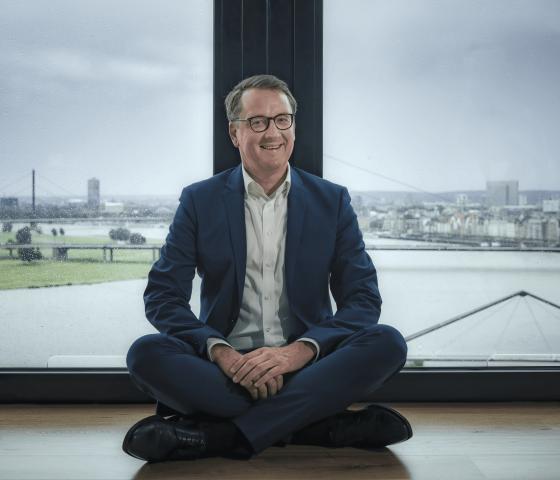
Seeing the big picture
In this interview with Roland Lorenz, Head of AFRY Management Consulting, we asked about his view on how the pandemic has changed the world of work and how clients benefit from AFRY's bold strategy focusing on sustainability and digitalisation.
In early 2020, AFRY started enabling its employees to have greater flexibility between office and home office, to accommodate to the pandemic as well as to support a better work-life balance. What are your learnings from this initiative?
The big realisation for me during the last year has been that the old set-up, which we left behind in a rush when the pandemic unfolded, is now history. We are entering a new era, where success is measured differently and where work communities are taking on a new shape. It is not fully clear yet what shape this will be in the long term, and actually that is in fact another thing to learn: arriving at the future workplace is a change process that will take a longer time. Thinking retrospectively, as a leader who has been in the business environment for a couple of decades, it was important for me to see full remote working in action to be fully convinced that it can deliver the same results, from both a technological point of view and from a people perspective.
My experience of people’s drive, motivation, time-management, sense of community and productivity in the remote-work setup has been extremely positive. Even with quite big challenges, such as children at home, the worries about the pandemic and full travel restrictions, there is no question that people have delivered excellent work that is equal to, if not better than, before. This is good news for the long term outlook and it will be exciting to see how people flourish professionally when it is possible to operate in the new hybrid working model without significant challenges and uncertainties. The big questions for me as we look to the future are not about productivity, as there is no question that full flexibility is a win-win for everyone, but rather about what framework needs to be provided to support individuals’ mental and physical health and what level of travel and face-to-face time will be appropriate, both from a human and from an environmental perspective.
Climate change and digitalisation are putting companies worldwide under enormous pressure to transform. As a group, AFRY is putting itself at the forefront of this transformation movement. How do you, as management consultants, help your clients to cope with these changes?
At AFRY Management Consulting we find ourselves well-positioned to support our customers through the transformation that is taking place across industries, which is led by digitalisation and climate change mitigation targets. The current pressure to change the way industries operate is higher than I have ever seen at any time. The combination of the myriads of possibilities opened up through digital capability and the non-negotiable necessity driven by climate change is causing a rethink of fundamental aspects, even in industries that have had a very long history of doing things a certain way. It is an exciting time when we look at all the possibilities to improve, but it can also be a daunting time for our clients owing to the sheer scale of the change that is required.
This need provides our people at AFRY Management Consulting with a strong objective and our overall offering very much corresponds to the needs we see emerging among our clients, as they take steps towards renewable energy and the circular bioeconomy. Looking at AFRY holistically, we see a similar dynamic and we also see how the many different fields of expertise that AFRY offers join up to make a bigger picture. For example, I see strong interplay between future cities, clean energy, industry, circular solutions, new materials, automotive and transport - just to name a few. In all of these different fields, AFRY Management Consulting's focus areas - strategic advice, forward-looking market analysis, operational excellence and transaction services - can make a meaningful difference to our clients' progress.
You describe AFRY Management Consulting as a "People Business". At the same time, however, you have launched a digitalisation offensive at AFRY this year. Isn't that a contradiction?
This is another shift from a rather outdated perspective to a new perspective. In contrast to a couple of decades ago, digitalisation in our business does not mean that people are redundant but rather that people are essential to enable our clients to understand digital solutions, opportunities and results. People will always be central to delivering the services that we provide in a management consultancy and digital tools are simply an enabler. It is a very exciting time to see how our people leverage a whole array of technology, from AI to drone monitoring, to augment and add depth to their work. And this development is exciting to observe across AFRY: Through our focus on digitalisation we have an impressive set of tools and competence at our disposal.

While listed companies worldwide struggle with formulating sustainability targets, AFRY is quite proactive in this regard. Increasing the proportion of female leaders to 40% by 2030, halving CO2 emissions per employee by 2030 and achieving net-zero emissions by 2040. Will your clients benefit from this sustainability strategy and if so, how?
Yes, AFRY has understood the importance of being future oriented in the areas of diversity and climate change mitigation. It is crystal clear for us that this is morally the right approach and at the same time the only feasible route for companies to take if they want to remain relevant in the long term. We are proud to be able to take bold steps in this area and find out what works, so that we can accompany our clients on their own journey towards meeting sustainability targets and shaping their business in a way that will yield results for decades to come. Success in the new business world involves a whole array of elements, from ensuring that operations are as effective as possible and understanding the market, up to embracing innovation and ensuring that the people at the core of the business are as diverse as possible, so that the right perspective is there to stay relevant in the long term. And it is important for us at AFRY to be brave and make sure that we are at the forefront, gathering these experiences in our own organisation to allow us to provide the best possible service to clients that have to progress along the same change curve.
It has been almost two years since ÅF and Pöyry became AFRY and you were appointed EVP and Head of AFRY Management Consulting. How have AFRY as a whole and AFRY Management Consulting developed since then?
In these two years we have understood much better how to sustain and implement the ambitions of the company, in terms of growth, market position and what we stand for. From the perspective of AFRY as a whole, we have gained a holistic view of the sustainability transition, how things are interconnected and the role we can play with our unique set of competences. This is an exciting perspective and seeing the difference AFRY can make in action as a brave, progressive and modern company is very motivating and keeps us aiming high. We can see this development reflected in our position in employer rankings and it is excellent that we can attract top talents to come and contribute to meaningful projects that make a real difference for our clients and for society as a while.
In terms of the development of AFRY Management Consulting over the last two years, we have noted a high demand for our services and have experienced strong collaboration with the other divisions, which has allowed us to leverage the combined experience that we have across AFRY to add value for our customers. Our position, as leading advisor for the transition of the energy and bioindustry sectors, fits perfectly into AFRY's "Making Future" vision and into our ambitions in the clean energy and bioindustry sectors. Over the last two years, AFRY Management Consulting has become well-established and is ready for growth on our core markets in all respects, both in geographical terms and in the digital and sustainable transition.
AFRY has a culture of brave leadership. What does it mean for you personally and how does this approach shape the company?
By brave leadership at AFRY, we mean endorsing diversity, being clear in the way we communicate, ensuring our people get a feeling of belonging, maintaining the highest standards of integrity, trusting and supporting our people and building a collaborative and innovative environment. These points are all highly relevant for my own understanding of brave leadership. I personally think that growth needs brave leadership and that brave leadership starts from the top. Fortunately, these values are reflected in the bold commitments made by our CEO Jonas Gustavsson in the areas of sustainability, diversity and inclusion, as well as the ramp-up of AFRY X. These decisions and the brave leadership approach give us permission within AFRY Management Consulting to pursue meaningful work and take a point of view on challenging topics. For me personally, the brave leadership philosophy harmonises well with my own leadership, that puts our experts at the forefront and empowers them to make a meaningful impact and pursue innovation in fields that are important for them personally as well as for our clients and future generations. Ultimately, as a modern leader, it is all about empowering people to use their individual talent and purpose to drive meaningful progress for clients, for our company and for society as a whole.



